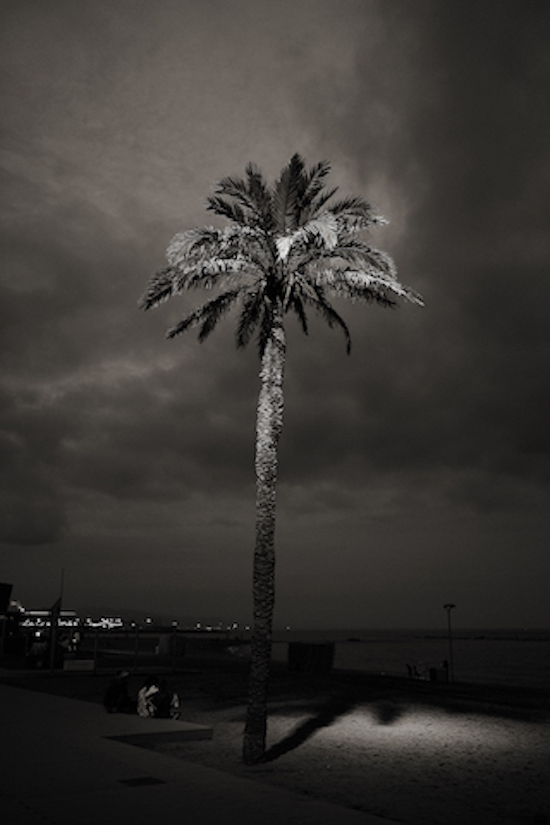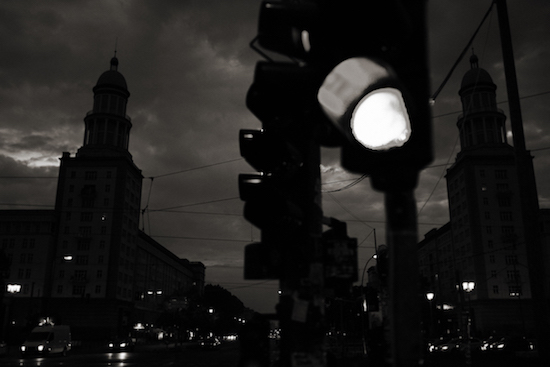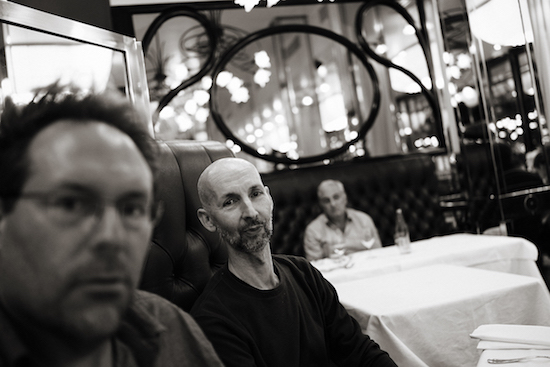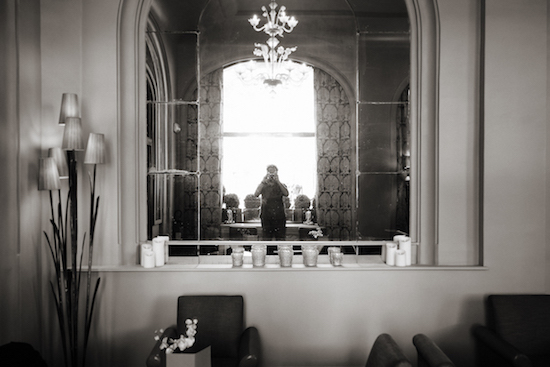All photographs courtesy of Rod Modell
The discography of Michigan-based artist Rod Modell, aka Deepchord, would take quite some time to fully digest. The skeleton of the genre had been laid out prior to the project’s formation in 2000 by acts like Basic Channel, Fluxion and Wolfgang Voigt, yet Deepchord played an undeniably important role in fleshing out the full possibilities of what we now call dub-techno.
Modell originally began the project with Mike Schommer, naming it after a term he’d invented to describe a particular sound common in techno music at the time. Since taking Deepchord solo, Modell has managed to maintain an impressive slew of full-lengths, sitting somewhere between meditative beat-loops and sound-design heavy ambience.
With the release of Ultraviolet Music, the latest in Modell’s series of increasingly lengthy studio albums, we decided to catch up with him to discuss photography, travelogues and blurred memories.
Can you tell us a little about Ultraviolet Music?
Rod Modell: It’s a collection of work that was made during 2015. I think the edges are getting a little fuzzier in my work. My influences lately are less electronic music (and the stuff currently going on in the electronic music world). I think my music is inspired more by natural phenomena and things like radionics and etherics. More otherworldly influences, like renegade shortwave radio transmissions in the middle of the night. Maybe a step further into the world of sound design and sampling rather than synthesis. I’ve been playing with synthesisers since 1985 and they are getting really boring. I’m looking for other ways to create new sounds and textures.
The LP has always seemed to be your main choice of format over EPs and singles – why do you think this is? When you are putting tracks together do you usually have a bigger picture in mind?
RM: Absolutely. Most of my tracks start off as 30-40-minute pieces that are edited down into a six to ten-minute chunk. Also, the interplay between tracks is very important. I see an album as a big story, and each track is a different chapter. This is very different than someone who makes two tracks for a 12". In fact, I think a lot of my music wouldn’t be effective unless it’s all tied together with the other tracks on a disc. When you hear one of them, they don’t make much sense because they are taken outside the context of the story. Actually lately, I’m finding the CD format too constraining. I would like to make 12-hour-long pieces and distribute them on USB stick.
I wanted to ask you about the videos of Echospace, your project with Steven Hitchell, aka Soultek, set to footage of trains travelling across Norway. What did you think of these? Do you think there is a strong relationship between travel and your music in general? I remember taking a night ferry whilst listening to Liumin (and Sommer on the return journey) and being struck by how fitting the soundtrack was.
RM: I loved that video too. I think the music is made for travel… on land and in the mind. I never consider the dancefloor when making a track. It’s really the last thing that I consider. I like making introspective soundscapes that take you somewhere. The ambience is the main part – the kick and bass are just incidental. The CDs are like mini travelogues. International cities are one of my main influences, and the music usually contains bits and pieces of places that I visit. Lots of processed audio clips and atmosphere. I carry small recorders everywhere and sonically document the places that I go.
Speaking of Echospace can you remember the first time you and Steven met? Have you considered further material together?
RM: Definitely. Steve is still a close friend, and we talk often. We actually first made contact in the early DC days. Probably ten years before The Coldest Season [Echospace’s 2007 debut]. He was sending us amazing demos. The best demos we got actually. A collaboration was inevitable. As life became more complicated, Steve decided he didn’t want to travel as much, so I started doing it alone as Deepchord. But we still talk about working on new material together, and it fact it’s probably more likely than it has been in a long time since he recently moved closer. I know we’re both up for it, it’s just been a matter of orchestrating time and schedules. I suspect it will happen in the near future.

You have mentioned in previous interviews that you spend a significant portion of your time in the Netherlands – is this still the case? Could you imagine moving out there permanently or does Michigan still feel like home?
RM: Not as much in the last two years. Between 2011 and 2013, I was there most of the time. Now, I’m back in Michigan more, but still go there a couple times per year. Amsterdam is my favourite city, and I never feel more at home than I do there (much more than Michigan). I feel like I belong there, and would actually like to relocate there full time. But I still own a home in Michigan, and my family is here, so I feel drawn to Michigan. But when I’m in Michigan, I feel more like a recluse. I’m not in Detroit. I’m about an hour north on Lake Huron, and my favourite part of Michigan is about 400 miles north in the upper peninsula of the state.
I think Michigan is my geographical home and Netherlands is my true home. But again, being near friends and family back in Michigan are important too. I miss 2011-13 when I spent more time in Amsterdam. I was in Amsterdam two weeks ago, and I feel recharged as soon as I get to Amsterdam Centraal and hop on the tram to my apartment. My heart is there for sure.
I was having a read over your bio, which states you had worked with Chris Carter and Cosey Fanni Tutti – can you tell us a bit about this?
RM: It wasn’t really a collaboration so much as playing some gigs with them back in my 1980s industrial days. Those times are a blur for me. Too much LSD and sleep deprivation. But their work has always been a inspiration. They are legends. Exotica is in my top five albums of all time.

I have a copy of the picture disc ‘Summer Night Versions’ 12" and wanted to ask whereabouts the photo was taken – assuming it was taken by you – and the story behind it.
RM: The ‘road side’ is Ipperwash Road in Lambton Shores, Ontario, Canada. Right at the foot of the road where it ends at Lake Huron. My grandparents owned a home about a half mile from this spot for 30 years, and I spent every summer here from the time I was born through my teen years, and I still go back six or seven times per year. It’s one of the most beautiful places I’ve ever been. It’s a mystical area. There’s a very weird atmosphere at night (in a good way).
The ‘pool side’ is the swimming area of a really old, somewhat dilapidated 1950s hotel in Port Huron, Michigan that I was fascinated with for years. It’s right at the end of I-94. I like the place because it’s a bizarre spot that time forgot. It looks really neglected. I don’t think it has much time left. I expect it to be torn down for a strip mall or McDonald’s restaurant at some point. There are always odd things happening there. Strange people doing strange things. I photograph it a few times per year. I feel like I’m in the Twilight Zone whenever I go there. A feeling that I particularly like. I hunt for places that make me feel like that. It’s a very David Lynch kind of place. Sometimes my safety even feels a little threatened there – that’s really exciting. I knew a guy who was a police officer in the area, and he would tell me stories about weird things that happened there. At one point, I was so intrigued by the place, that I rented a room for two weeks and stayed there to absorb the ambience. It was surreal.

With Peter Ford
More generally, what inspires you in terms of photography? Do you think there’s a specific style you look for when taking pictures for Deepchord releases?
RM: I guess I never really photograph specifically for a Deepchord release. When I come out with a project, I search for photos that support the feeling of the music. My photos are a lot like my music. They are mostly done at night, and – to me – feel like there’s more going on than meets the eye. I think it’s like this with my music also. There are layers on top of layers, and sometimes you don’t really hear everything until after a few passes. I look for surreal places. They’re photos that take the viewer to some weird spot that they probably wouldn’t go to alone. I like places that are a little creepy.
Finally, what’s next for yourself? Any more projects in the works?
RM: Absolutely. I seem to work on music at a steady pace of a couple songs per month. Those get filed and resurface at some point. I’ve been working on a project with two friends, Christopher McNamara and Walter Wasacz, called Shorelights. It’s more of an audiovisual project. Chris teaches film-making at the University of Michigan and does live video mixing. It’s music and visuals inspired by the elements, and mostly the Great Lakes.
I see my work going more and more in this direction as I get older. I feel less connected to the techno world, and more to this art-centric scene. I’m focusing more on installation work rather than dancefloor stuff. Sound and video for unconventional spaces… maybe where people can lay down and close their eyes during a ‘show’. Techno has always been a host organism for what I do. I don’t really feel like I make techno, or dub for that matter. But people who enjoy those genres have taken me in and adopted me as part of their scene. Back in the ’80s, when I was doing ‘performances’ with a shortwave radio and six guitar pedals, the newly blossoming techno crowd heard what I was doing and said… "That’s pretty cool, you wanna play a chill-out area at our next event?" Seems like that’s what’s still happening today. Thankfully, techno people are open minded, intelligent souls looking for interesting art. They adopted me and I’m happy to be a part of their community.
Ultraviolet Music is out now on Soma Quality Recordings


